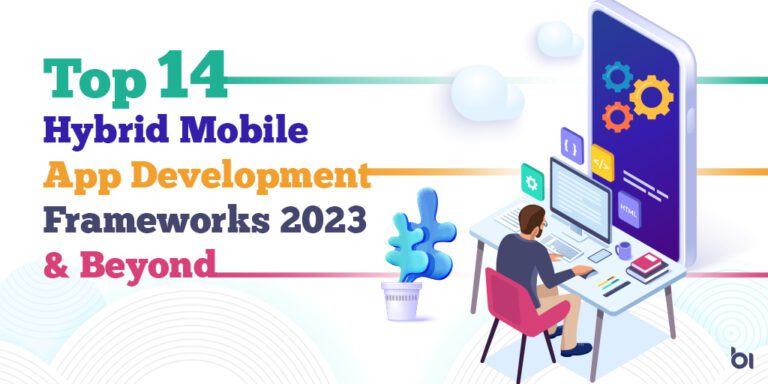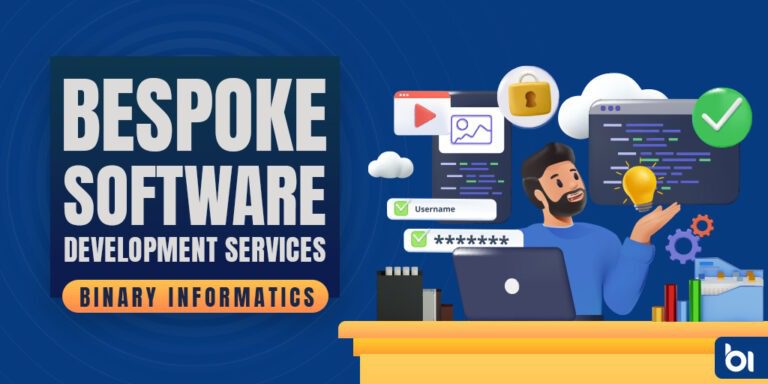Hybrid app development Frameworks have gained a lot of prominences and taken immense adoption in recent years. It’s no wonder that many software development teams are opting-in for hybrid mobile app development frameworks instead of native ones because they provide faster development, easier prototyping, and a reportedly better ROI.
Hybrid mobile app frameworks make developers’ life easier by enabling them to build mobile applications that run on multiple platforms using a single code base with no extra effort. The application will run on Android and iOS and the code can be reused for progressive web applications and desktop applications.
In this post, let us dive into a list of the Best hybrid mobile app development frameworks that can help you build amazing hybrid mobile apps cost-effective.
Here is the list of best hybrid mobile app frameworks 2023, that can make hybrid app development more simple –
Best Hybrid Mobile App Frameworks
1. Flutter : Premier Hybrid Mobile App Development Framework

There has been noted a lot of hype regarding Flutter in the last two years. Google’s premier open-source hybrid mobile app development framework or SDK has earned the respect and popularity of developers worldwide. It uses the powerful language Dart, another magnum opus of Google’s, and the C++ rendering engine. Flutter enables developers to create apps with high-productive values, creative UIs with flexible designs allow compelling interactions that lead to the creation of brilliant MVPs
Pros
- Create highly creative UIs with flexible designs
- Allow compelling and continuous interactions
- Create superb foundation libraries and widgets
- Provide a hot reload feature- enabling coders to see the changes in the app in real time.
- Endure smooth UI designs with unorthodox design elements
- Perfect choice for MVP
- Dynamic code writing
- Great Compatibility with Fuchsia
Cons
- Lack of profile data completion (iOS) feature
- Apps created using Flutter are (on average) 40 percent bigger in size than native apps.
- Developers have to learn Dart before using Flutter
- Minimal support for some critical features
2. Ionic : Open-Source Hybrid App Development Frameworks

Ionic is amongst the most popular 100% free and open-source hybrid app development frameworks, licensed under MIT and powered by a massive worldwide community.
It provides smart tools and services using Web technologies like CSS, HTML5, and Sass and uses a lot of Angular concepts to catalyze the process.
Pros:
- Create uncomplicated with easy updates
- Provide native functionalities
- Rich library with front-end building and UI components
- Offer pre-generated app setups with creative layouts
Cons:
- Don’t provide hot reloading
- Many dependencies on the plugin
- Not good for heavy apps
3. React Native : Best Framework For Hybrid App Development

React Native is one of the best hybrid app development frameworks, offering a native-like experience among apps with more stability. It let you compose a rich mobile UI from declarative components.
Pros:
- Save Expenses with max code reuse
- Support Node.Js
- Native code rendering
- Easy & faster identification of bugs
- Take less development time
- Provide lots of plugins to enable compatibility
- Provide Live reload for two screens- one for code modification and the second to preview the changes.
Cons:
- Not good for apps having numerous screens, too many UI transitions, and heavy special effects.
- Sometime struggle to access hardware components
- Insufficient custom modules and navigation components.
4. PhoneGap : Get Reliable Cross Platform Compatibility

PhoneGap is one of the top hybrid app frameworks, supported by the Cordova framework, and provides reliable cross-platform compatibility with just one code for all platforms. Provide some other worthy features, including greater access to Native APIs, strong backend support, and extensive UI libraries that reduce developers’ efforts.
Pros
- easy to learn
- Good compatibility with a single codebase for iOS, Android, and Windows 7 platforms
- Rugged backend system
- Supports HTML5, JavaScript and CSS3
- Facilitate rapid and effective testing
- Highly compatible with the plugin architecture
Cons
- Apps can be slower
- Work well for smaller businesses only
- Fewer pre-built UI widgets
Read more on Offshore software development services.
5. Svelte Native : Youngest Hybrid Mobile App Development Framework

Svelte Native is the youngest hybrid mobile app development framework, quickly growing in popularity among web developers all thanks to its simplicity and immense capabilities. It creates code that can automatically update native view widgets when the app’s stage changes.
Pros
- Building fast web applications
- Interactive user interfaces
Cons
- It Is still in the early stages, you might experience some issues.
- No cross-platform support.
- Small community
6. Xamarin : Superior Hybrid App Development Framework

Xamarin is another best hybrid mobile app development framework, acquired by the software giant Microsoft. It has been written using C# which is more modern and has improvement scope over Java and Objective-C. What made Xamarin superior is- it has the means to include libraries for Java, C++, and Objective-C directly.
Pros
- Provide native UI features
- Easy setup
- Reusable code
- Brilliant connectivity with hardware components
- It has its own fully developed ecosystem
- Continuous performance without being unstable
- Easy & effective API integration
- Fast GUI prototyping
- Excellent code sharing and maintenance
Cons
- Highly expensive
- Do have some platform-specific limitations
- Overhead codes
- Unable to allow smooth integration
- Lag in API support
- Not ideal for game development
7. NativeScript : Smart Hybrid Mobile App Development Framework

NativeScript is the best hybrid mobile framework for developing cross-platform apps coded in JavaScript, TypeScript, or Angular. Using Angular with NativeScript enables you to share large chunks of code between your mobile and web apps.
Pros
- Easy access to API
- Fast Execution
- Compiles down as a native code
- Runs as a native app
- Split custom content
- Support for Vue.js.
- Efficient code sharing between mobile and web apps
- Easy integration with third-party libraries
Cons
- Bad documentation
- Unrealistic assumptions
- Misleading description
8. Axway Appcelerator : JavaScript-Based Hybrid Mobile App Framework

Axway Appcelerator is a JavaScript-based cross-platform hybrid mobile app development framework, provides full support for Android and iOS. Its platform-independent APIs make it easier to access phone hardware.
Pros
- Platform-independent APIs
- Full support for Android and iOS
Cons
- Inevitably lead to hard-to-debug issues.
Read more on 5 Key Approaches to App Development: When & Why to Choose.
9. Kendo UI : Enjoy Heavy Feature & UI Component

What makes Kendo UI, one of the best hybrid mobile app development frameworks? It offers a good collection of JavaScript UI components with the libraries of Agular, React, jQuery, and Vue. It offers advanced features that allow you to easily add advanced UI components
Pros
- Enable you to easily add advanced UI components
- Allow data export in mime formats
- Great editor control
Cons
- Lack of support on rare occasions
- Datasource has a learning curve
- Improper documentation.
10. Framework7 : Get UI That Run On Any Platform

Framework7 is an open-source and free top hybrid mobile app framework, that offers UI components that can run seamlessly on any platform. Framework7 can be paired with advanced tools like NW.js, and electron except for HTML, CSS, and Javascript.
Pros
- Easy to learn and implement
- Provide plenty of widgets and components
- Huge Built-in libraries.
Cons
- Less supporting online community
- Quite average documentation.
11. Onsen UI : Fastest Hybrid App Development Framework

Onsen UI is another good hybrid app development framework, that allows you to create applications and components for various operating systems. It provides the fastest ways to develop HTML5 hybrid applications.
Pros
- Easy to learn & use
- Performance optimized for a range of devices
- Ensure a smooth experience even on lower-end devices
- Ready-to-use components and automatic styling
Cons
- Weak documentation
- Inconsistent support
12. Aurelia : Enjoy Effortless Coding & Unmatched Extensibility

Aurelia is one of the most powerful top hybrid mobile app frameworks with effortless coding and unmatched extensibility capabilities. It allows users to create multi-platform apps with better routing, and composition. Enable developers to create components using vanilla JavaScript or TypeScript.
Pros
- It supports an extensive online community
- Suitable for small and large-scale apps
- Simplified testing
- Easily extensible
- Effortless coding and conventions
- Good performance
- React binding
Cons
- Slow learning curve
- Average documentation
13. Quasar : Experience Simultaneous Deployment Using Single Code Base

Quasar is again a good hybrid mobile app development framework, that enables developers to write code a single time that can be deployed simultaneously as a website (SPA, PWA, SSR), mobile, and desktop apps using a single code base.
Pros
- Offers HTML/CSS/JS minification
- Cache busting
- Tree shaking
- Source mapping
- Code-splitting & lazy loading
- Great accessibility features
- Keeping a small performance overhead
- Very thorough documentation and active community.
Cons
- Lag on mobile
- Are too heavy
- Don’t contain enough components
- Complicated to understand
- Designed well visually and programmatically.
14. Ext JS : Enterprise-Grade Hybrid Mobile App Development Framework

Ext JS is an enterprise-grade hybrid mobile app development framework, fit to build data-intensive, cross-platform web and mobile applications. Good for creating high-performance hybrid mobile apps with near-native experience and packs ready-to-use widgets with a native look and feel.
Pros
- Packs ready-to-use widgets
- Drag and drop HTML5 visual application builder
- Huge library of ready-to-use templates
- Built-in support for Angular and React
Cons
- File dependency on one another
How to Find Best the Hybrid Mobile App Development Framework?
Since there are several different Hybrid Mobile App Development Framework out there, how do you know which is the best one for you?
Most of the above-listed hybrid mobile app development frameworks are offering a comparable set of development features. Here the best way to get the right answer is to start with your project requirements and what you are looking for in the framework.
It also depends on the-
Your level of expertise: If you are a beginner, a framework that is easy to set up and has a low learning curve, would be more suitable; if you are experienced, an advanced framework would be a better choice for you.
The kind of app you want to develop: depends on your cost, speed, performance, compatibility requirements, and what kind of features you are looking for.
End User: Users of the app are important components of the success of any application, what kind of look & feel and user experience you want to provide to users.
Final words on Hybrid Mobile App Development Frameworks!
The hybrid app frameworks are the real ‘Avengers’ behind the triumph of hybrid mobile app development. Smart developers and business owners are making the most of these advanced frameworks to develop hybrid apps superior both in their overall look and performance.
If you’re planning to develop a hybrid mobile application, choosing a hybrid app framework can also help you build apps for the web and desktop, which can help you reach more customers more easily. After going through the list of best hybrid mobile app frameworks? Well, it’s a really tough one to pick the best framework for mobile app development in 2023. You can take professional help. Binary Informatics is a leading mobile app development company in India, with expertise in building robust, reliable, and scalable hybrid mobile applications with efficiency and speed.
Want to explore more about our hybrid mobile app development services, feel free to reach out to us!




